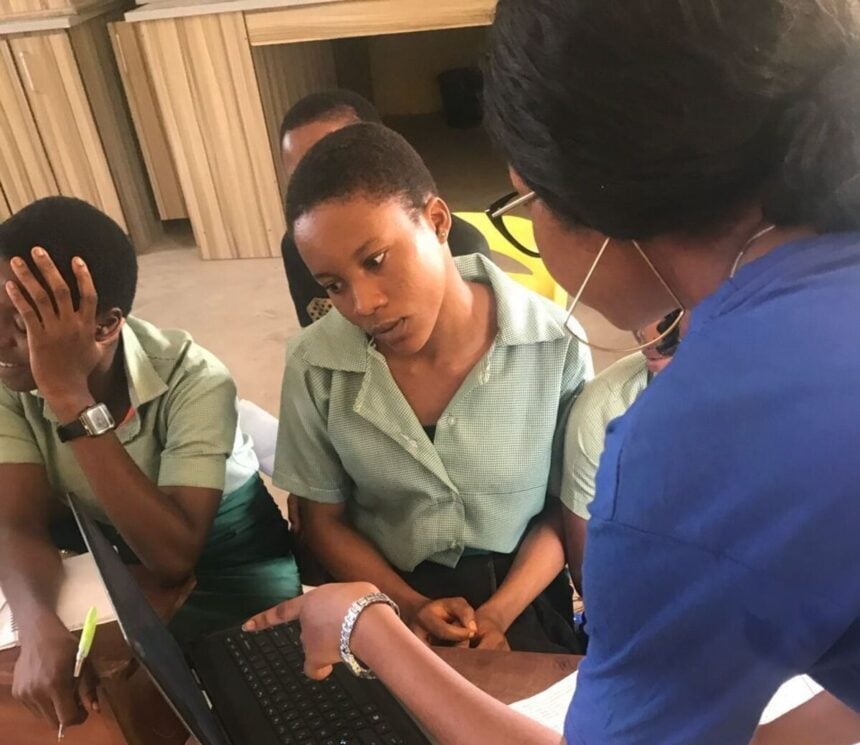Adebola Aderemi
While the conversation around Nigeria’s digital future often focuses on big cities and broadband infrastructure, some of the most meaningful progress is happening quietly, in overlooked classrooms across the country.
In Ogbaku, a town just outside Owerri in Imo State, Uchechi Unamma is doing something different, bringing digital skills directly to students who’ve never had that kind of access before.
From March 19th to 20th, 2024, Unamma’s team led a hands-on digital training session aimed at demystifying technology for secondary school students.
“You don’t need to write code to create impact,” Unamma said at the opening session. “We want to show these young people that they have a place in the digital economy, right here in their own communities.”
Under the banner “Low Code, High Impact,” the project brought digital literacy to the doorstep of students in Ogbaku, many of whom have limited access to electricity, let alone broadband internet.
Working with a lean team of volunteers and borrowed laptops, Unamma and her team taught students to use Thunkable, Glide, Canva, and Miro, platforms that enable users to build mobile apps, websites, digital graphics, and user journeys without writing a single line of code.
What followed was nothing short of remarkable.
By the second day, students were pitching original ideas for digital tools that could address local challenges: a mobile app to help farmers record harvest yields; a digital reminder system for WAEC exam prep; a visual storytelling platform for sharing cultural heritage. These were not passive learners, they were creators.
Unamma’s work ties directly to the goals outlined in Nigeria’s National Digital Economy Policy and Strategy (2020–2030), which emphasizes inclusion, innovation, and human capital development.
However, while the federal government has committed to broadband penetration and ICT infrastructure, grassroots digital education remains heavily underfunded, especially in rural areas.
This is the gap Unamma is trying to fill.
“Many interventions stop at urban centres, but what about the communities that are left behind?” she asked.
“How do we prepare our rural youth for a future that is already digital?”
“For communities like Ogbaku, where unemployment and lack of exposure continue to limit youth potential, this kind of intervention is not just educational, it is strategic.
“By democratizing access to tech creation tools, Unamma is building what some have called a “shadow pipeline” of future innovators, coders, and tech entrepreneurs.
Even more striking is the cost-efficiency of the approach. With minimal funding, a few laptops, and free cloud-based software, the program trained over 60 students in under four days—some of whom had never touched a laptop before the workshop began.
“Before now, I didn’t think I could ever work in tech,” said Chidiebere, a 15-year-old student. “But now I’ve made an app idea that could help people in my village. I want to learn more.”
What’s Next for the Movement? Following the success of the Ogbaku training, Unamma has already begun conversations with educators and local government officials in neighbouring LGAs to replicate the program.
A virtual alumni support group has also been formed to help participating students continue practicing their new skills beyond the workshop.
Her long-term vision? To build a national network of no-code training hubs, embedded within existing school systems and powered by local youth leaders who can cascade the training forward.
She’s also calling on state governments, NGOs, and private tech companies to invest not only in high-end innovation centres, but in entry-level, grassroots digital skill-building.
“We talk about exporting tech talent and leapfrogging into the fourth industrial revolution,” Unamma said. “But the future workforce is sitting in schools like these. If we fail to meet them where they are, we fail as a country.”
In a season where global conversations on AI, machine learning, and blockchain dominate tech headlines, Uchechi Unamma’s approach is refreshingly grounded.
She’s cultivating talent, and In the process, she is proving that the next chapter in Nigeria’s tech story may not be written in Lagos, Abuja, or even Silicon Valley, but in the school labs like in Ogbaku.
WATCH TOP VIDEOS FROM NIGERIAN TRIBUNE TV
- Let’s Talk About SELF-AWARENESS
- Is Your Confidence Mistaken for Pride? Let’s talk about it
- Is Etiquette About Perfection…Or Just Not Being Rude?
- Top Psychologist Reveal 3 Signs You’re Struggling With Imposter Syndrome
- Do You Pick Up Work-Related Calls at Midnight or Never? Let’s Talk About Boundaries







